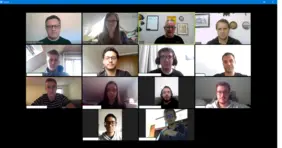Even before the corona pandemic, digitalization was one of the most important topics in academic and industrial contexts. Social distancing and new concepts of working and studying from home make it more important than ever. While international exchange is currently facing a rather uncertain future, fortunately, the new internationalization project enGlobe – engineers go global (2019-2023) counted on digitalization even before the crisis: the international digital study project of the AWARE Center of Technische Hochschule Ingolstadt (THI) was already developed and planned before the crisis – so the students could start without delay.
The idea of an international digital project is quite simple: A group of THI students works digitally with students of one of our chosen partners in America in a project jointly supervised by professors of both universities. As the topic is directly suggested by an industry partner of the universities, the project is not only promoting international and intercultural skills, but also application-oriented learning.
This year, Prof. Dr. Alessandro Zimmer (THI/UFPR) is launching the pilot project with the Brazilian partners Universidade Federal do Paraná (UFPR) and Renault do Brasil. The groups work on joint challenges, meeting via MS-Teams every week, communicating and exchanging documents via the THI Moodle access. In the first weeks, they prepare themselves theoretically in learning more about computer vision algorithms, programming languages like Python, aspects of Automated Guided Vehicles (AGVs), the use of SWOT analyses etc., before they start with the practical part directly related to the Renault plant in Curitiba. However, the project is not completely spared of the current crisis: the originally scheduled visits of both groups to the partner country for their final presentations can rarely be compensated by digital tools. The right digital solution to replace face-to-face intercultural exchange and personal connections is still to be developed.

